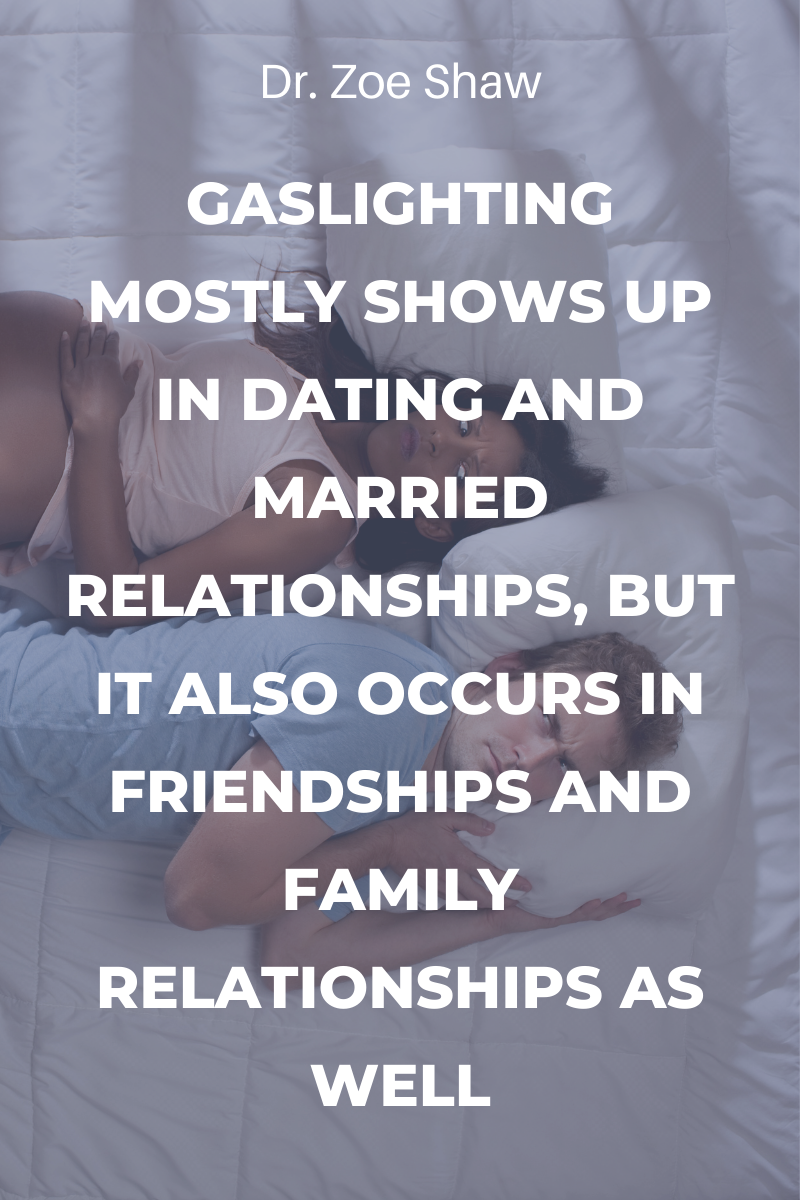I once had a client who came in because she was having problems in her relationship with her significant other. All the signs were screaming at her that he was being unfaithful. It was glaringly clear, but every time she confronted him about it, he blew up in anger, accusing her of being overly sensitive, insecure and explained that it was the very reason why he wouldn’t propose to her as promised four years ago.
Any time she bought up the evidence or questioned his disappearances, women’s items in his car, the roses he bought for someone else, the whispers at work, he would cite her inquisition as the very reason why he wasn’t ready to marry her. He was verbally abusive and began telling her she was crazy and needed to get help.
She came to me, not because she recognized that she needed help getting out of an unhealthy relationship, but because she wanted me to help her curb her jealousy, learn to reduce her feelings of sadness, distrust, and anger and reduce her obsessions with who he may be talking to and where he was when he disappeared for hours. She said these feelings she was having were ruining her relationship and she needed help to make them go away.
You may be listening incredulously, shaking your head and thinking- isn’t this clear?
And it is – crystal- from the outside, but when you are amidst the trees, it’s is very murky and muddy and few of see clearly.
I told my client I would not engage in helping her endure dysfunction and abuse better. I would help her learn tools and gain strength to spot it, counteract it and possibly leave it (him), but I wouldn’t help her disown herself- nor do I know how to do that. He was the expert at that.
My ability to call it what it was validated the super still, small voice inside her that said, “I’m not crazy.”
She was being gaslit
What Is Gaslighting?
Gaslighting is a form of manipulation that occurs in some dysfunctional relationships. It’s a subtle, type of emotional abuse where your partner questions your reality. Ultimately, at its worst, you begin to doubt yourself and your perceptions
Gaslighting can sound like:
“You’re so dramatic”
“You’re too sensitive”
“You’re too emotional”
“You’re imagining things”
“You know you sound insane right now, right?”
“You’re always making stuff up”
“You’re making a big deal out of nothing, like always”
“Nothing you’re saying makes sense, do you even hear yourself?”
“You’re being paranoid”
“You’re acting crazy” or “you’re overreacting”
“I was joking! You take everything personally”
“That never even happened.” “This is what happened…” or “this is what I said…”
“You’re not thinking clearly”
“You’re making yourself the victim when I’m the one who should be mad”
Gaslighting mostly shows up in dating and married relationships, but it also occurs in friendships and family relationships as well.

How Gaslighting Works
Gaslighting is an effective technique that makes you question your entire perception of reality- or a slice of it from a certain angle. When someone is gaslighting you, you slowly begin to stop trusting yourself and your instincts.
After an interaction with a gaslighter, you walk away wondering what is wrong with me? And in extreme cases, you begin to question your own sanity.
Here are a number of tactics used when gaslighting:
They Lie
The basic tenant of gaslighting is lying to you in an attempt to manipulate your reality. Gaslighters are deceivers at their core. They will blatantly lie to your face and never change their stories, even when you have proof and they’ve clearly been caught. Unfortunately, even when you know deep down that they are lying, they are extremely convincing and you are left doubting yourself.
They Discredit you
They may make little jokes about you to your friends. They may say “she doesn’t know what she’s talking about” or “she’s getting it all wrong.” They may accuse you of outright doing the very thing they are doing in order to get others to side with them, isolating you and tampering with your grip on reality.
They may tell you that everyone else agrees with them or that other people have called you crazy-when that’s never happened, getting you to question the people who you previously trusted.
They flip the script
When you ask a gaslighter a question or point out an incongruence with something they said or did, they may change the subject by asking a question instead of responding to the issue. Or they accuse you of the same thing, “Well, how do I know I can trust you?” They may blatantly lie about the situation by saying something like: “You’re making things up. That never happened.”
They Minimize Your Thoughts and Feelings
If they can get you to accept being treated like a child, they will have gained power over you. If you express negative feelings or anger, they may respond with, “you need to calm down,” “you’re always overreacting,” “you’re making a big deal over nothing,” “this is why I don’t like to… with you.” All of these statements send a message to you that what you are feeling doesn’t matter and isn’t correct.
When you learn that expressing your feelings creates anger in your partner, you will tend to express them less and you are left feeling invalidated, misunderstood and alone.
They Shift the Blame
Blame-shifting can sometimes work so well, that you are left feeling guilty for something you haven’t done. A gaslighter will shift every conversation so that somehow you are to blame.
If he tells you he is too busy to help you make dinner and you express your disappointment that he isn’t holding up his end of your agreement, he may respond with , “I’m the one that’s busy and you’re making this all about you. Why are you so selfish? If you wouldn’t make things all about you, I would probably want to help out more.” He’s claiming that if you behaved differently he would treat you better.
They Deny, Deny, Deny
The mantra for a gaslighter is under all circumstances, deny. Even if they’re caught red handed, deny. It’s crazy making to see something with your own eyes and have someone look you straight in the face and say you didn’t see what you saw. I have had clients second guess themselves on the most blatant of behaviors. A husband whose breath clearly reeks of alcohol will say, ” no, you must be mistaken. I haven’t been drinking.”
Lying keeps them from having to suffer the consequences for their current behavior, but it also sets them up for a foundation of uncertainty for future behaviors. It’s a two-for-one. And when your reality isn’t even acknowledged, your pain isn’t as well. This makes it hard to separate and leave the gaslighter because you can’t even come up with a reason in your own head, let alone tell anyone else. “I’m leaving because I think these things may have happened? I’m leaving because I had a bad feeling?” Your trust in yourself is completely destroyed. Women will often tell me, I have no proof. My answer is you don’t need proof. You need to trust yourself.
They use love as a weapon- especially during the honeymoon phase.
Remember, you catch more flies with honey. No gaslighter will start out making you feel horrible about yourself. That tactic won’t work right off the bat. They know they have to woo and shower you and they will do this intermittently – just enough to keep you and just enough to combine love with abuse to leave you even more confused.
“You know I love you, right?” “I get angry because I love you so much.” “You know I would never mean to hurt you.”
When you are dealing with someone who uses gaslighting as a manipulation tool, pay close attention to their actions, not their words. Is this person truly loving, or are they only saying loving things?
Twisting and Reframing Conversations
Gaslighters typically use this tactic when you are discussing something that happened in the past. For instance, if your partner shoved you against the wall and you are discussing it later, they may twist the story in their favor. They may say you stumbled and they tried to steady you, which in turn caused you to fall into the wall.
When stories and memories are constantly retold in the gaslighter’s favor, you may begin to doubt your memory of what happened. And that is exactly the goal.
You may wonder, is this purposeful? Are they planning this out step by step? How could this be? My first answer is, it doesn’t matter. Often if a woman hears that this behavior isn’t purposeful, then her tendency is to excuse it and say to herself, he doesn’t realize he’s doing this. He really loves me.
I say it doesn’t matter because dysfunction is dysfunction whether anyone is aware of it or not. Although there is a subset of people, mostly sociopaths who will purposefully plan out this type of behavior, the majority of gaslighters are utilizing learned behaviors. But they are all aware of what they are doing, even if they aren’t consciously planning it out.
Your job is not to be the psychologist. Your job is to protect and care for yourself.
And I already know the next question, Can he change? I believe that anyone can change, but we should never hang our hats on the hope that they will.
The consequences of staying engaged with a gaslighter are anxiety, depression and a shattered self-esteem. We don’t want any of this, so your job is to show up with strong, clear language and to not back down.

Here are 16 phrases you can say to neutralize a gaslighter:
“I realize you disagree with me, and this is how I see it”
“Your perspective is different from mine. I’m not imagining things”
“I hear that your intention was to make a joke, but the impact was hurtful and that matters”
“My feelings are my feelings; this is how I feel”
“This is my experience and these are my emotions”
“I can see you feel strongly about that, and my emotions are valid too”
“I feel like I’m not being heard, and I want some space”
“I know what’s best for me”
“This is what I want and what I need right now”
“I’m making this decision for myself”
“I’m not responding to that”
“I can figure things out for myself”
“I have heard your point of view many times now, and I still don’t agree with it,”
“I’d like to take a break from this conversation”
“I am not going to put any more energy into proving my perspective”
“I get that you’re mad, and I’m angry too”
When you are practicing these statements, be mindful of the way you convey the message. Being able to communicate in an assertive manner can make a big difference regarding how the other person receives the message and also how you feel afterward.
So, I’m going to say this clearly. If you recognize any of these behaviors I talked about today, you my dear friend are not crazy, you are not too sensitive. Your opinion, your feelings, your thoughts matter. Don’t stay silent. You are not weak. Your perception is fine and you can make good choices. Love yourself enough to do so.
You’ve got this!
Share this Post

